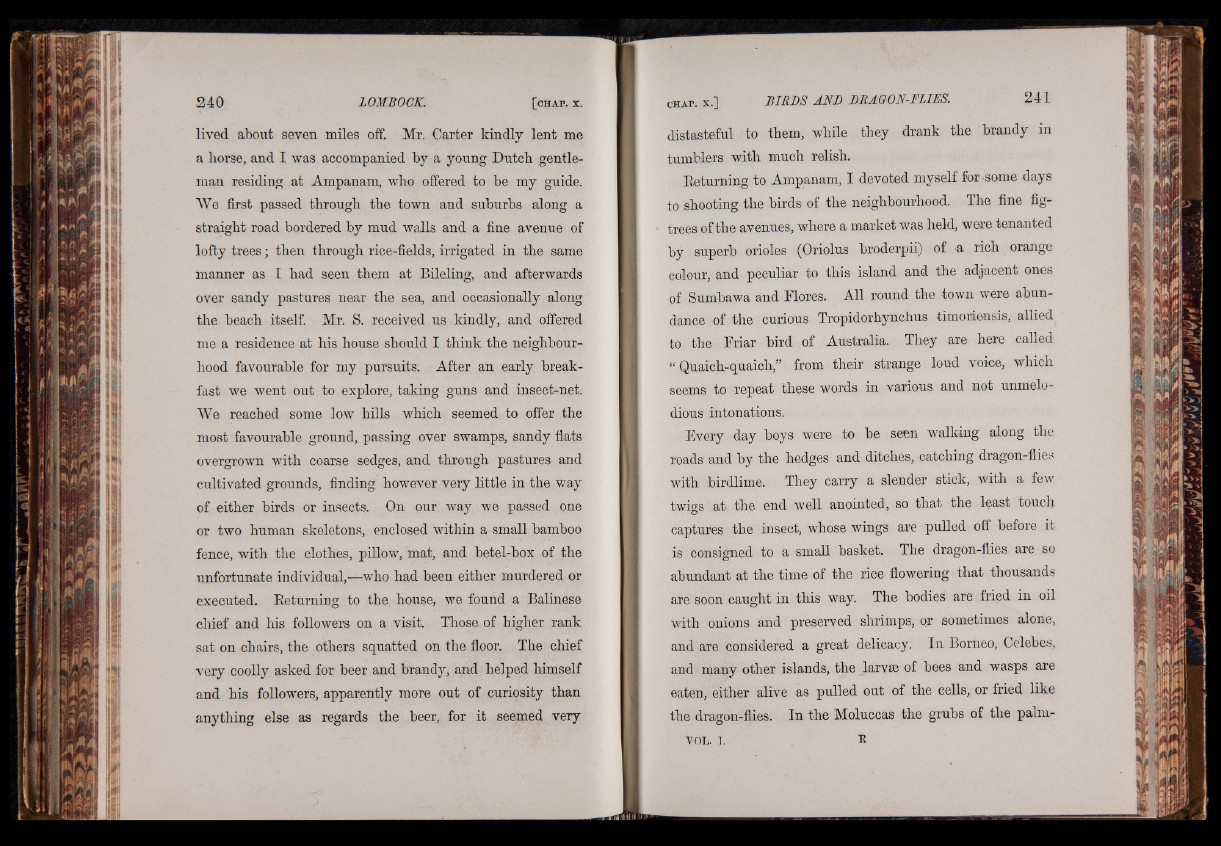
lived about seven miles off. Mr. Carter kindly lent me
a horse, and I was accompanied by a young Dutch gentleman
residing at Ampanam, who offered to be my guide.
We first passed through the town and suburbs along a
straight road bordered by mud walls and a fine avenue of
lofty trees; then through rice-fields, irrigated in the same
manner as I had seen them at Bileling, and afterwards
over sandy pastures near the sea, and occasionally along
the beach itself. Mr. S. received us kindly, and offered
me a residence at his house should I think the neighbourhood
favourable for my pursuits. After an early breakfast
we went out to explore, taking guns and insect-net.
We reached some low hills which seemed to offer the
most favourable ground, passing over swamps, sandy flats
overgrown with coarse sedges, and through pastures and
cultivated grounds, finding however very little in the way
of either birds or insects. On our way we passed one
or two human skeletons, enclosed within a small bamboo
fence, with the clothes, pillow, mat, and betel-box of the
unfortunate individual,—who had been either murdered or
executed. Returning to the house, we found a Balinese
chief and his followers on a visit. Those of higher rank
sat on chairs, the others squatted on the floor. The chief
very coolly asked for beer and brandy, and helped himself
and his followers, apparently more out of curiosity than
anything else as regards the beer, for it seemed very
distasteful to them, while they drank the brandy in
tumblers with much relish.
Returning to Ampanam, I devoted myself for some days
to shooting the birds of the neighbourhood. The fine fig-
trees of the avenues, where a market was held, were tenanted
by superb orioles (Oriolus broderpii) of a rich orange
colour, and peculiar to this island and the adjacent ones
of Sumbawa and Flores. All round the town were abundance
of the curious Tropidorhynchus timoriensis, allied
to the Friar bird of Australia. They are here called
“ Quaich-quaich,” from their strange loud voice, which
seems to repeat these words in various and not unmelodious
intonations.
Every day boys were to be seen walking along the
roads and by the hedges and ditches, catching dragon-flies
with birdlime. They carry a slender stick, with a few
twigs at the end well anointed, so that the least touch
captures the insect, whose wings are pulled off before it
is consigned to a small basket. The dragon-flies are so
abundant at the time of the rice flowering that thousands
are soon caught in this way. The bodies are fried in oil
with onions and preserved shrimps, or sometimes alone,
and are considered a great delicacy. In Borneo, Celebes,
and many other islands, the larvae of bees and wasps are
eaten, either alive as pulled out of the cells, or fried like
the dragon-flies. In the Moluccas the grubs of the palmv
o l . T. R